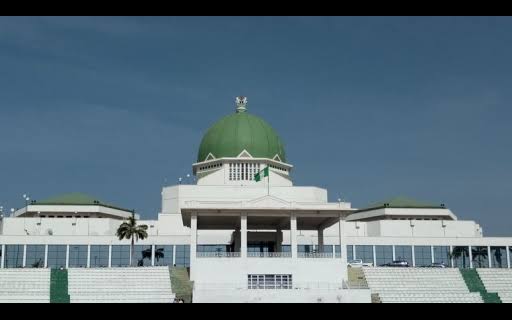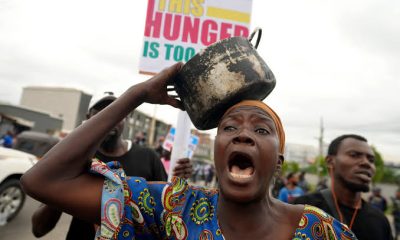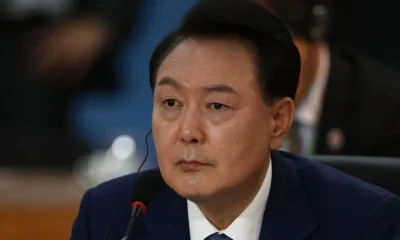National news
National Assembly Urges Increased Capital Project Funding

- National Assembly Members Says, Boosting Capital Funding Would Have a More Significant Impact on the General Populace
- The Overall 2024 Budget Performance Stood at 43%, With Recurrent Expenditure Reaching 100%
- Lawmakers Calls For More Releases For Capital Projects of MDAs for Projects as Schools, Roads, Hospitals and Other Social Infrastructure
The National Assembly has voiced concerns over substantial disparities between recurrent and capital expenditures in the 2024 budget, as well as the inadequate funding allocated for capital projects in government establishments.
Eko Hot Blog gathered that during a joint session on Wednesday, the Chairmen of the Senate and House Committees on Appropriations, Senator Solomon Adeola and Honourable Abubakar Birchi, along with the Presidential Economic Team, deliberated on the 2025 Appropriation Bill and stressed the need for immediate action to increase capital project funding.
EDITOR’S PICK
- No 100% Telecom Tariff Hike – Details Of Meeting With Communication Minister Emerge
- Oxford English Dictionary Adds 20 Nigerian Words – Agbero, Japa, Make List (See All)
- Outrage as Lagos Teacher Slaps Toddler, Faces Investigation
Lawmakers emphasized that boosting capital funding would have a more significant impact on the general populace, as opposed to recurrent expenditure, which affects only a small portion of the population.
Their stance followed a report presented by the economic team, led by Finance Minister and Coordinating Minister of the Economy, Mr. Wale Edun.
The report indicated that the overall 2024 budget performance stood at 43%, with recurrent expenditure reaching 100%, while capital budget only achieved a mere 25% performance.
Senator Adeola said that he was an advocate of drastically reducing the ratio of recurrent expenditure to capital in the budget from the present level of about 80% for recurrent and 20% for capital to at least 60% to 40%, stressing that capital projects in the budget and their implementation was a major spur for economic growth and direct impact on the people.
“Capital releases to MDAs are the major drivers of economic activities within the nation. Non-release of funds for capital projects is a major issue in the performance of the 2024 Budget so far and it is desirable that funds are released to prevent abandoned projects and ensure the success of the Renewed Hope Agenda of the president,” he stated.
Senator Adeola said it would not be good news for MDAs to come for their 2025 budget defence with a record of non-performance of their core mandates as contained in the capital budget stressing that within the period of the 2024 budget still running, effort should be made by Finance Ministry to release funds for capital projects.

Supporting the position of his Senate counterpart, Hon. Birchi called for more releases for capital projects of MDAs for such projects as schools, roads, dams, hospitals and other social infrastructure instead of such items as debt repayment which he argued can be restructured in the interim.
“Most of the items of recurrent expenditure which takes a huge part of our budget and is implemented 100% will only directly affect about 10% of our population while capital projects of the MDAs will directly affect the majority of over 200 million Nigerians in areas of social infrastructures provisions like hospitals, schools, roads, energy and similar” he stated.
The Minister of Finance acknowledged the presence of pending capital releases awaiting funding but emphasized the importance of avoiding past mistakes, such as spending money without proper resources, to prevent potential consequences experienced by countries like France and Germany.
Alhaji Abubakar Bagudu, the Minister of Budget and Economic Planning, attributed the substantial recurrent expenditures in the budget to Nigeria’s current developmental stage and societal challenges, including military campaigns against insecurity.
These expenditures, according to Bagudu, have contributed to improved agricultural production and economic activities.
Dr. Tanimu Yakubu, the Director General of the Budget Office, linked the significant recurrent expenditure to past legacies inherited by President Bola Tinubu’s administration, such as unpaid pensions and gratuities, which have since been addressed.
Yakubu suggested that the National Assembly might need to consider legislation to cap recurrent expenditure in future budgets.
FURTHER READING
- Girl, Boyfriend Nabbed By Police for Staged Kidnap and Ransom Plot in Asaba
- Two Nigerians Face 40-Year Jail Term for $560,000 Romance Scam in U.S.
- Lagos Police PRO Benjamin Hundeyin Promoted to CSP Rank
Also in attendance at the meeting were the Minister of State for Finance, Dr. Doris Uzoka-Anite, and the Permanent Secretaries of the Ministries of Finance and Budget and National Planning.
The attendees discussed waivers and tax holidays, which have contributed to decreased government revenues, exploring potential solutions to these issues.
Click here to watch video of the Week
Advertise or Publish a Story on EkoHot Blog:
Kindly contact us at [email protected]. Breaking stories should be sent to the above email and substantiated with pictorial evidence.
Citizen journalists will receive a token as data incentive.
Call or Whatsapp: 0803 561 7233, 0703 414 5611


















You must be logged in to post a comment Login